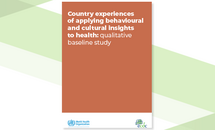Country experiences of applying behavioural and cultural insights to health: qualitative baseline study
This report summarizes the conclusions of an interview study with public health authorities in Europe and Central Asia, exploring the barriers and drivers to advancing the use of behavioural and cultural insights (BCI) for health.
Executive Summary
With a regional WHO resolution related to this field and a regional 5-year plan with five concrete strategic commitments, WHO Regional Office for Europe jointly with the European Centre for Disease Prevention and Control in January–February 2023 wished to gain a deeper understanding and context to the official reporting. The findings highlighted commitment to and optimism about BCI-related work and indicated that the WHO regional resolution, BCI action framework and reporting requirements are drivers of change.
Barriers to advancing BCI work were related to
- skills (behavioural science, problem definition, trialling and impact evaluation, and translating evidence into policy or interventions);
- staff, funding and time;
- communicating messages to decisionmakers;
- bridging processes for research and decision-making; and
- organizational culture.
Suggestions for possible solutions included
- the use of case examples to demonstrate the impact and value of BCI-related work;
- training;
- funding and staff; and
- awareness-raising among decision-makers.
Regional and international partners were asked to
- establish networking structures;
- ensure advocacy;
- collate good practice and case examples; and
- offer training and capacity-building.





